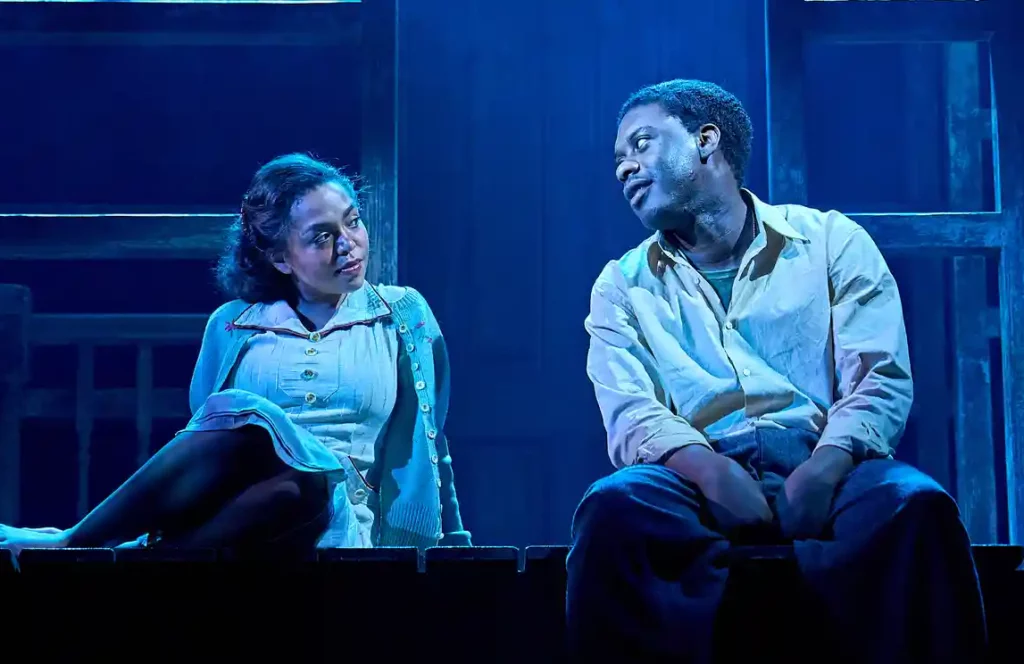Maisie Allen enjoys Trouble in Butetown, currently at the Donmar Warehouse in London until 25 March 2023.
Strobing lights and a search party are about for American soldier Nate, lost in Tiger Bay, as Diana Nneka Atuona’s Trouble in Butetown opens on the Donmar Warehouse stage in Covent Garden, London.
Set against the backdrop of World War Two and the influx of American soldiers stationed in Cardiff in the Maindy Barracks, Trouble in Butetown follows Valleys matriarch Gwyneth and the boarding house she runs in Tiger Bay when Nate shows up at her doorstep. What follows is a series of secrets unravelling that threaten everything Gwyneth has built for herself and her two daughters after the death of her Nigerian husband a few years prior as the result of a sunken U-boat.
Atuona’s script addresses everything head on, with a firm tone and fair judgement of each character’s moral dilemmas
Sarah Parish’s interpretation of Gwyneth is subtly layered, and Parish deftly moves between her fragile grief and her stern maternal manner that extends to her brother Patsy, and two boarding guests Norman and Dullah. The house’s atmosphere still manages to suffocate Gwyneth’s eldest daughter Connie (played confidently by Rita Bernard-Shaw), who is desperate to join the Women’s Air Force and leave Tiger Bay. The house isn’t technically licensed, which is something that hangs over the cast’s heads as they figure out what to do with their adopted American GI when the police come to pay them a visit. Atuona’s script moves in-between the familial warmth of the house and the coldness of the community outside that is trying to keep African-American soldiers from mixing with others in the Bay.
It was, however, easy to tell that both Atuona and director Tinuke Craig had little experience with displaying Welshness on stage at times. What this might even look like is a discussion too extensive for this review, but the references to Welsh cakes, cawl, and St David’s Day that punctuated the play felt out of place and were at times redolent of early vision boards in script development sessions. At its heart, this is a story about a Welsh community and its inhabitants that does not fit the mould of a whitewashed historical narrative, and their encounter with Black American soldiers mesmerised by the contrast between this culturally diverse hub and their experience of the Jim Crow laws. In short, there was no need to bring in Welsh cakes as a prop – accents and settings would be enough.
Syniadau uchelgeisiol, awdurdodol a mentrus.
Ymunwch â ni i gyfrannu at wneud Cymru gwell.
There is a tendency with historical dramas to smooth over harsh and ugly truths, but Atuona’s script addresses everything head on, with a firm tone and fair judgement of each character’s moral dilemmas. There was sometimes a tendency to lean into an ‘easy way out’ with certain scenes. Dullah’s familial requirements to marry someone from the same Muslim background is met by his girlfriend Peggy, a Black non-Muslim woman, with quiet despair and eventual acceptance, instead of an interrogation into what it means to live somewhere like Tiger Bay.
Craig’s direction of the cast is particularly noticeable during the smooth transitions between scenes, often alternating between the house, garden, and the rafters that meet at the top of the staircase as the cast weave in and out of motion. Peter McKintosh’s intricate set design leaves plenty of secret spaces for the cast to hide behind, sneaking around in the shadows. Rosie Ekenna, one of two young actresses playing Gwyneth’s youngest daughter Georgie, steals the spotlight when she eavesdrops into adult-only conversations with wit and a glint in her eye.
Atuona and Craig gave the cast a lot to process, attempting to tackle a wide social commentary that has been decades in the making since the Bay’s subsequent gentrification. As a result, the pace of the second act feels rushed and its resolution tied up a bit too quickly with an awkward turn of events before the final climax. Budding romances and friendships are sharply switched off, and any attempt to answer the questions posed in the first act are ignored. Just as the play opened, the ending sees Nate on his own in a state of ambiguity, in contrast with the rest of the characters’ stories – but by this point, the shock value has been lost. By the end of the play, not even the search party can find a final dramatic punch for this otherwise sleek production of Trouble in Butetown.
The warmth of Atuona’s story shines throughout, however, and the strong dialogue of the first act set the scene perfectly for a tale of shock deceit, betrayal, and a chosen family working together in the face of ostracisation.
This review was written by Maisie Allen thanks to the Books Council of Wales’ New Audiences Fund.
All articles published on the welsh agenda are subject to IWA’s disclaimer.





